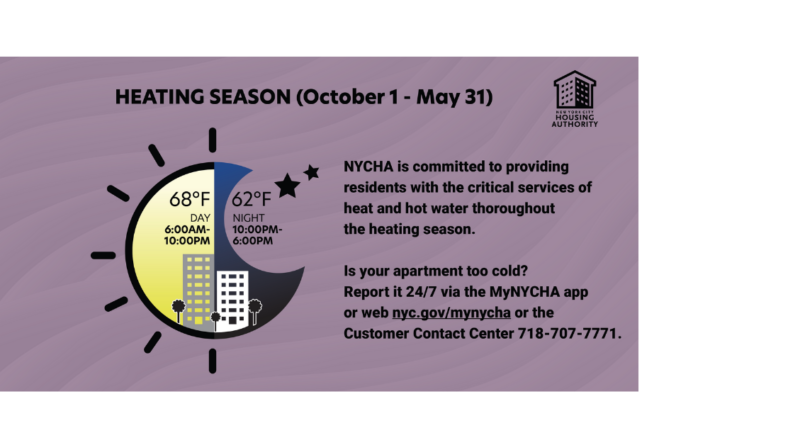Heating Season Begins October 1
From October 1 through May 31, New York City building owners must maintain an indoor temperature of at least 68 degrees between 6 a.m. and 10 p.m. when it’s below 55 degrees outside. From 10 p.m. to 6 a.m., indoor temperature must be at least 62 degrees regardless of the temperature outside. Hot water must be kept at a minimum temperature of 120 degrees at the source year-round.
NYCHA’s Heating Management Services Department remains committed to providing residents with the critical services of heat and hot water through the heating season.
NYCHA is in the process of modernizing heating controls at 66 developments. With the new controls, residents at these developments may have a different heating experience than they had in the past. Apartments that used to be typically overheated are now at a more comfortable range of 72-74 degrees during the day and 69-71 degrees at night, with the heat coming on in cycles to prevent overheating, underheating and save energy. Residents at these buildings no longer need to open their windows to let out excess heat.
“At buildings with the new heating controls, some apartments have indoor temperature sensors, which are thermostats that help us determine the distribution of heat in the entire building, instead of relying on the outdoor temperature,” said Edwin Mendez, NYCHA’s Acting Deputy Director of Energy and Sustainability Programs. “These controls help us more accurately determine what the temperature is inside the building and help ensure that everyone in the building has consistent heat so that they can be comfortable during the winter season.”
Here are some additional tips to help keep your apartment feeling comfortable this winter:
- Keep your windows fully closed, top to bottom, because open or leaky windows can make you feel cold even if the heating system is working as it should. If you feel air, contact NYCHA.
- Consider removing your window air conditioner, or covering it, for the winter. Leaving an air conditioner installed in the window is the same as having a six-inch hole in your wall. If you cannot remove and store your air conditioner for the winter, consider insulating it with a cover and weather-stripping around the sides to reduce cold air coming in.
- Move furniture away from radiators or baseboards to keep the air moving freely. If radiators/baseboards are blocked by furniture, they will only heat what is in front of them and not the rest of the room.
- Open the hand valve on your radiator. Turn the knob to the left to open it (more heat) and the right to close it (less heat).
- Lower your blinds or draw your curtains at night. Warm air hitting a cold window will cause a draft, even if there’s no cold air coming in from the outside. The curtains or blinds prevent drafts.
- Keep hallway and stairwell windows closed. Many are left open year-round, letting in cold air all winter.
Are you having an issue with heat or hot water?
Residents experiencing issues with heat or hot water should call the Customer Contact Center at 718-707-7771 or report the issue via the MyNYCHA mobile app or web version. You should also contact NYCHA when:
- Your temperature is out of range: The temperature in your apartment should never fall below 68 degrees during the day or 62 degrees at night. When you call, tell us what your temperature reading is, and in which room.
- You have hot pipes and cold radiators: If the riser pipes are hot and your radiator is cold, first make sure the hand valve is open (to the left). If the valve is open and the radiator is still cold, tell NYCHA staff and ask them to change your radiator trap.
- Your window is not closing properly: Request window repair if your window is not closing all the way or if you feel air coming in above, below, or between the sashes.
- Steam is leaking into your apartment: Ask NYCHA staff to fix all steam leaks immediately.
- Your building’s front entrance door does not fully close.
Remember, please call the CCC at 718-707-7771 or use MyNYCHA to report any issues with heat or hot water.
View a shortened version of this message in: Español |中文 (繁體 / 简体) | Русский

